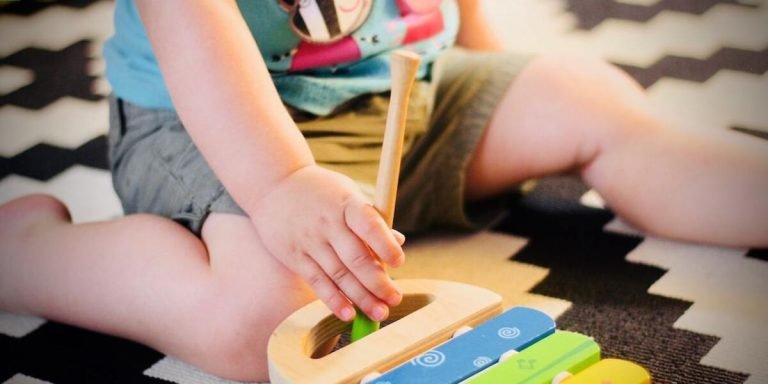Activities to do with 1 Year Olds: Fun & Educational Ideas for Parents and Educators.
Navigating the world of childhood education can sometimes be a maze, especially when it comes to finding suitable activities to do with 1 year olds. At this tender age, their brains are like sponges soaking up every bit of new information they encounter. Thus, selecting educational yet fun-filled tasks is crucial in fostering not only their physical and mental growth but also helps set a strong foundation for developing vital skills such as motor coordination and cognitive abilities.
This blog post intends to shed light on some incredible ideas for parents and educators searching for engaging activities fit for one-year-olds. Each recommended activity is specifically designed keeping early childhood education principles at its core; aimingto stimulate young minds without losing sight of the importance that play holds during these formative years.
Did you know?
Did you know? At one year old, toddlers begin to develop fine motor skills and love exploring with their hands. Incorporating activities that involve squeezing or pinching like play dough can aid in their physical development!
The Importance of Play in Early Childhood Development
Engaging one-year-olds in fun activities not only helps them enjoy their early years, but also plays a significant role in promoting cognitive and emotional development. Coupling these activities with technology takes the learning experience to an entirely new level while paving the way for seamless integration into today’s digital world.
In 2023, as education continues its rapid evolution due to technological advancements, understanding how play contributes significantly to early childhood development can help parents and educators create vital opportunities for young minds. Play is no longer viewed merely as recreation; instead it has become essential educational tool that accelerates growth through exploration and discovery – a concept embraced by modern-day tech-savvy families who value multifaceted child rearing approaches.
Conducting stimulating interactive games or participatory storytelling sessions using vetted apps encourages problem-solving skills among toddlers. Similarly, introducing age-appropriate virtual reality scenarios enhances spatial awareness at this tender age too. It’s important though that caregivers strike a balance between screen time and hands-on physical interaction within real environments since both have unique roles offering holistic developmental benefits.
Through integrating immersive technologies effectively into playful learning environments we involve children actively thereby promoting critical thinking abilities even before they formally step foot inside conventional classrooms.
Stimulating Sensory Activities for One-Year-Olds
Sensory play is a critical aspect of early childhood development that begins right from birth. In fact, renowned child psychologists have identified them as the basis for children’s learning and skill acquisition in their later years. For one-year-olds, these sensory activities not only stimulate their developing senses but also foster curiosity, enhance memory and motor skills.
Incorporate these activities into your toddler’s routine without complex tools or technology. Here are simple yet engaging ways to enrich this developmental phase through sensory stimulation:
1. **Texture Play**: Introduce different textures to your baby using items around the house like fur fabrics or kitchen utensils made up of various materials – metal spatulas, wooden spoons etc., This encourages tactile exploration.
3.Experimenting With Food : Allow messy eating! Letting babies squish mashed potatoes between fingers can be beneficial besides being fun!
4.Scented DIY Toys : Fill socks with aromatic spices like cinnamon or lavendar creating touch friendly toys while introducing smell sensations simultaneously .
5.Water Games: Splashing water during baths helps infants understand liquid properties noting how it feels when splashed on faces vs hands.
Parents can incorporate tech in subtle ways reinforcing offline experiences.Teachers could present similar concepts via interactive online software fostering correlation between real-world objects and digital representations enabling deeper understanding.
Cognitive Skill-Building Games for Toddlers
“Activities to do with 1-year-olds need not always revolve around the traditional concepts of play. In fact, stimulating cognitive development in toddlers can be achieved seamlessly through certain games and activities that integrate technology.
Firstly, interactive storybooks are a great tool for early childhood education. They offer engaging animation and sounds which capture a toddler’s attention while nurturing their listening skills and enhancing vocabulary. Numerous apps available today transform classic children’s books into interactive adventures, thus promoting cognitive development while keeping toddlers entertained.
Secondly, color-and-shape matching apps introduce 1 year olds to basic geometry by teaching them how shapes differ from each other as well as helping in recognizing colors – all instrumental for building cognition at this age.
Lastly but importantly is aged-appropriate digital drawing tools encourage creativity amongst little ones without causing any mess commonly associated with hands-on painting activities!
Enhancing Motor Skills Through Creative Play
In the world of early childhood education, enhancing motor skills through creative play has taken a whole new meaning in 2023. While traditional methods continue to hold great importance, newer ways are leveraging technology to fuel creativity and advancement in youngsters’ development. One such strategy is integrating tech-enhanced activities for one-year-olds that contributes significantly towards their coordinated movements.
Creative play using digital tools can be an enriching experience for these young learners as they begin developing important fine and gross motor skills at this age. An interactive touch-and-feel book on a tablet screen not only keeps them engrossed but also helps refine hand-eye coordination with every swipe or tap they make.
Furthermore, think about mobile applications that encourage motion-based engagement – simple games where toddlers have to move objects around by tilting the device can stimulate muscle control while making it fun as child’s play should be!
The brilliant interplay of education and technology conveys that learning doesn’t always need pens and pencils; sometimes tablets do better! It creates a stimulating environment filled with colours, sounds, movement – all actively contributing toward enhancing precious little ones’ motor abilities during crucial formative years.
Indoor Obstacle Courses: Safe Movement Exploration
An indoor obstacle course can be set up effortlessly using everyday household items like cushions, small boxes, or even a line made from masking tape on the floor. This toddler-friendly activity encourages young ones to crawl under ‘tunnels’, step over ‘boulders’ and walk along zig-zag paths – ensuring an adventurous journey within the secure environment at home.
A significant advantage of this is that it promotes physical literacy in toddlers while enhancing decision-making abilities as they navigate their way around these obstacles. The hands-on nature of such games makes them ideal for incorporating into early childhood education settings too.
With aid from augmented reality (AR) apps designed specifically for preschoolers, you can transform routine playtime into an interactive educational experience right at home! These immersive applications typically involve engaging visuals accompanied by straightforward instructions which guide entrants through different stages – providing rich sensory inputs simultaneously improving spatial awareness and coordination.
Encouraging Fine Motor Growth with Simple Crafts
Fine motor skills are crucial in early childhood education, and there’s no better way than engaging children in simple crafts. These fun-filled activities not only keep the little ones engaged but also aid their development — a win-win situation for both parents and educators alike.
Engaging one-year-olds with craft-themed games is an effective yet enjoyable approach to improving fine motor skills. The essence of these activities lies within the interaction between hand-eye coordination, touch exploration, grasp-and-release mechanisms which play critical roles during this developmental stage.
The thrill of molding dough into various shapes can be exciting for toddlers; particularly when they begin observing shapes around them and trying to replicate those using clay or dough at home. This process builds a higher level of concentration removing any space for distraction thereby refining precision.
Simple drawing exercises on digital platforms serve two purposes – integration towards technology literacy and developing fine motor skills through precise finger movements required while sketching on screens.Online coloring books enable kids familiarize themselves with different colors enhancing visual cognition alongside reinforcing grip control as well.
Building blocks have always been integral part of learning toolkit especially designed targeting skillset improvement amongst 1 year olds . Through repeated stacking ,unstacking operations toddlers learn maneuver objects expertly around them .
Language and Social Interaction in Toddlerhood
As the role of technology expands in our everyday lives, it’s becoming increasingly essential to integrate digital learning into early childhood education. This is especially true when honing language and social interaction skills amongst toddlers, particularly if we consider 1-year-olds as an instance. Engaging activities that incorporate technological tools can foster rapid development on these fronts.
One practical application could be interactive storybooks provided via tablets or other devices playfully enhance a toddler’s vocabulary while promoting deeper engagement with language acquisition processes. These books often feature colorful visuals and audio narration that captures their attention better than traditional formats might do, making them perfect for busy one-year-olds who are just beginning to explore the world around them.
Furthermore, child-friendly applications focused on peer interactions introduce social concepts at an age-appropriate pace by using character-driven narratives where each persona has distinct emotional responses to situations typical in the life of a one year old. Thus not only does this acclimate children digitally but also cultivates empathy through relatable content seen virtually first then mirrored behaviorally.
Cultivating such tech-integrated environments opens up novel avenues for learning and growth catering specifically towards infants in today’s digital era – shaping up future-ready generations adeptly skilled from young ages itself!
Interactive Reading Sessions to Boost Vocabulary
Interactive reading sessions boost vocabulary in toddlers. Engaging one-year-olds in these activities effectively develops language and social interaction. Incorporate this into your little ones’ routine by following these steps:
1. **Choose Age-Appropriate Books:** The importance of selecting age-appropriate books cannot be overstressed, especially when dealing with 1 year olds who may not understand complex narratives yet.
2. **Act It Out:** Transform the story into an interactive session by using gestures, expressions and sounds that correlate with the plot or characters – making it more enjoyable as well as beneficial.
3. **Use Technology Integration Tools**: With advancements in technology like virtual pop-up books or interactive storytelling apps, consider integrating them into your reading routines seamlessly for enhanced word recognition abilities amongst toddlers.
4.Personalize Story Time: Turn reading time into treasure hunting where new words become treasures waiting to be discovered!
5.Repetition is Key: Do repeat lines from familiar stories frequently – repetition aids comprehension and assists enormously in vocabulary enhancement.
In conclusion,, incorporating interactive reading sessions enriched through technological means offers an innovative approach towards early childhood education , augmenting opportunities related to language acquisition alongwith fostering societal bonds amongst our newer generations..
Role-Playing Scenarios to Foster Emotional Intelligence
Role-playing is an engaging and interactive method to teach emotional intelligence in toddlers, especially when it involves activities appropriate for one year olds. We live in a technologically advanced world where integrating technology into education has become pivotal.
One of the simplest ways to engage your toddler is through everyday home scenarios using toys or props around the house. With items like dolls, pretend kitchen sets could narrate situations about sharing food with others showing empathy while doing so.
The latest innovation that works excellently well are digital role-play games designed specifically for children as young as one-year-olds. They feature age-appropriate characters and simple narratives easy-to-understand by these tiny tots encouraging them to mimic positive behavior displayed on screen.
Another popular choice among parents nowadays is virtual playdates which can be facilitated via video conferencing tools installed either smartphones or tablets providing ample opportunities not only social interaction but also collaborative play enhancing both communication skills along with understanding different perspectives hence boosting emotional quotient.
In conclusion remember learning best occurs when it’s less of academic drilling more good fun times shared together at end day all we want our kids grow up being compassionate global citizens after all isn’t ultimate goal?
Conclusion
In wrapping up, it’s paramount to remember that the early years of a child’s life are crucial for their cognitive development. Ensuring they engage in meaningful and enlightening ‘activities to do with 1 year olds’ is fundamental to nurturing their burgeoning skills. The sea of ideas provided here should serve as an intriguing starting point, sparking creativity while assisting your little ones on their developmental journey.
Feel free not just to stick around but also delve deeper into our website where you’ll find numerous resources dedicated specifically towards childhood education. We have countless more articles presenting fresh perspectives on parent and educator support creating an educated community in contributing positively towards every child’s growth story!







